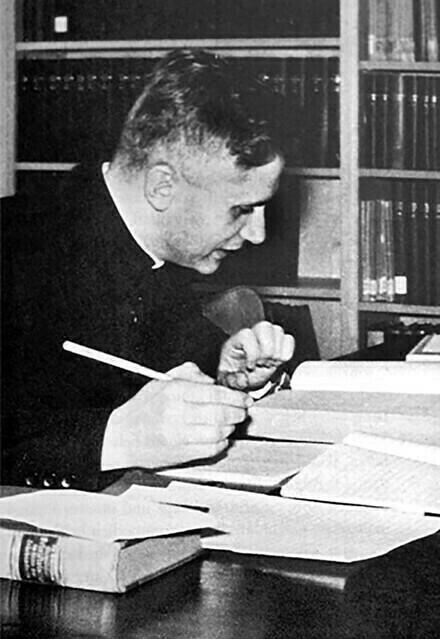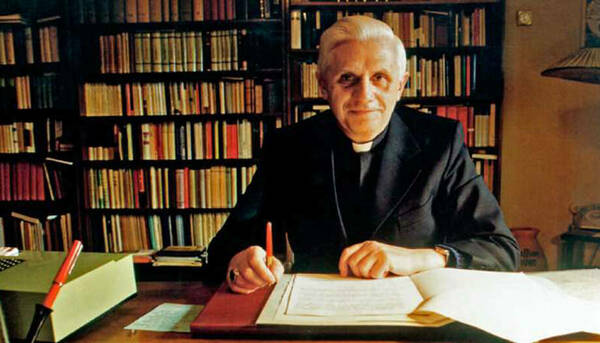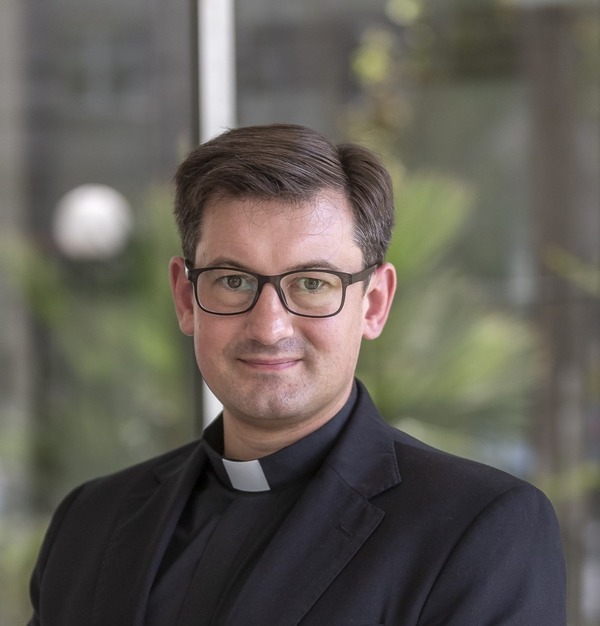Laws, Religion, and Ratzinger:
Part I: Religion’s Role and Reason
European states have had a long, yet often conflictual, relationship with religion and the power religion exerts in legislation. Since ancient times, religion always held a particular and public role in society. Indeed, the persecutions of the Maccabees in Israel or the Christians in the Roman Empire were seen by the authorities as political actions by the state. Cunctos populos, the Edict of Thessalonica (380 A.D.), which made Christianity the Empire’s official religion, led to other problems. Before Christianity, the emperors and kings saw themselves as political and religious leaders. This perception did not end with the Edict. Thus, the calling of councils and the naming of bishops was also a political consideration. The Gelsian Doctrine of the Two Swords (494 A.D.) presented a distinction between the Church’s spiritual authority and the royalty’s secular power and gave priority to the authority (auctoritas) over the power (potestas). An example of this view was the Carolingian integration of power and authority. However, soon after, the investiture dispute broke this balance whereby the naming of bishops and abbots was reduced principally to a political problem: did the king or the pope name the bishop? This political crisis was resolved in the Concordat of Worms (1122 A.D.).

The most significant rupture occurred with the Protestant Reformation, which then led to the Wars of Religion. The ensuing treaty, the Peace of Westphalia (1648 A.D.), established the principle of “cuius regio, eius religio” – that is, the religion of a region depends on the ruler’s religion. This in turn led to a problem: Catholicism previously was the uniting force between peoples and the morality that could be used as a claim against unjust laws. In the event of an unjust law, one could appeal to the pope in Rome. What could determine which laws were just and not now that there was no common morality?
There were various solutions to this problem. Grotius’ “etsi Deus no daretur” (as if God did not exist) and Descartes’ provisional morality were the first post-reformation attempts at finding common ground. In England, Hobbes, Lock, and Sedgwick proposed an empirical one. Utilitarianism, which determines good and bad on the consequences of an action, has undergone various modifications and is accepted by many today, especially in the Anglo-Saxon world. Back on the continent, Kant proposed seeking an independent guide for establishing morality that used reason as the legislator who would determine if an action was good or bad in itself. The ultimate authority was to be reason itself and none other.
As Paolo Flores states in “Democracia Crucificada”, since 1848 the European discussion of legislation was founded on secular reason (non-religious). The legitimization of political power was popular sovereignty whereby citizens, using reason with no religious arguments allowed, passed laws without reference to any divine authority. In this context, thinkers like John Rawls and Jürgen Habermas have considered which procedures and norms reason must establish for ordering a modern pluralistic society. Their proposals link religion with “comprehensive doctrines.” These types of doctrines contrast with the principles of a pluralistic society where no absolute truth can be coercively imposed on others who hold different comprehensive doctrines. In typical Kantian style, one cannot know the true nature or essence of an object (the noumenon) but only as it appears to one (the phenomenon). Thus, the derivation must follow a specific procedure established by the reason to dictate what is correct/right or not.
Joseph Ratzinger’s position regarding how to legislate returns to the concept of natural law. In his discussion with Habermas, the Dialectics of Secularization: On Reason and Religion, he points out his problem with majority determinations: “The majority principle always leaves open the question of the ethical foundations of the law.” Moreover, he questions the link between the just and what is legal, “this is the question of whether there is something that is of its very nature inalienably law, something that is antecedent to every majority decision and must be respected by all such decisions.” Ratzinger then proposes that “self-subsistent values flow from the essence of what it is to be a man, and are therefore inviolable: no other man can infringe them.” He repeats this in his speech to the Bundestag, “Yet it is evident that for the fundamental issues of law, in which the dignity of man and of humanity is at stake, the majority principle is not enough.”
When looking for the presuppositions of the law, Ratzinger points to the fact that while modern society has put in doubt religious reasons due to religious fundamentalism and fanaticism, reason itself needs limits and points to the atom bomb and the giant leaps in biotechnology. He calls religious fundamentalism the “pathology in religion” while referring to the limitless and blind reason as the “pathology of reason.” This pathology of reason is very troubling as it leads to blind subjectivism, which in turn creates tribalisms or fractions in democratic society. In order to restore reason, we must, quoting Kurt Hübner, “free ourselves from the blindness typical of our age, that is, the idea that faith has nothing more to say to contemporary man because it contradicts his humanistic idea of reason, Enlightenment, and freedom.”

Ratzinger proposes that there is a rationality of nature that reason can discover. Unfortunately, today, nature is equated to animal nature, and many do not understand the concept of metaphysical nature. In perennial philosophy, it is assumed that there is a rationality in nature that can be discovered by reason and that this rationality is normative, for there are acts that are in themselves “inhumane” and not just because the majority decides that they are not to be permitted. This view is the basis of the Universal Declaration of Human Rights (1948), whereby they recognize rights that are derived from man qua man and not because the state grants these rights.
However, positivist reasoning rejected that an “ought” can come from an “is”. Consequently, man qua man (as an “is”) cannot be the source of rights (“ought”). This is the predicament that Habermas and Rawls faced in deriving the rights and duties of citizens. Their derivations were based on reason alone. Ratzinger’s proposal returns to the concepts of nature, reason, and religion. In Ratzinger’s addresses to the Bundestag (2011) and the House of Westminster (2010), he speaks of the need for religion to correct the distortion of reason or open wide the windows of the self-limitation of positivistic reason. Thus, religion is not to be expelled from the public sphere or the discourse of public reasons. Rather, religion must be retained in the realm of the reasonable in order to serve and illuminate reason.
Yes, on one hand, religion illuminates and protects but does not arbitrarily determine what is right or wrong (For natural law is not a religious concept but a philosophical one, one that must not be loaded with, as Ratzinger says, so much religious content that it is reduced to merely a doctrine, unable for secular reason to accept.) On the other hand, reason does not dictate what is right or wrong either but discovers nature’s law. Reason is not the supreme legislator.
This posture leads us to a concept of “human ecology” which Ratzinger will use in describing natural law, a law that reason can know. Nature has a rationality and can be known. Some actions are according to this nature and others that are not. Unnatural acts are not arbitrarily defined by some supreme act of the will (be it a religious institution or a secular legislature). And thus, as Ratzinger will continue to state, there is an ecological crisis, a crisis not just of physical nature but also of human nature and the way contemporary society does not listen or heed nature’s voice. This concept will be further analyzed in a subsequent article.
Suggested further reading
Benedict XVI. “Apostolic Journey to the United Kingdom: Meeting with the representatives of British Society, including the Diplomatic Corps, politicians, academics and business leaders at Westminster Hall (City of Westminster, 17 September 2010). https://www.vatican.va/content/benedict-xvi/en/speeches/2010/september/documents/hf_ben-xvi_spe_20100917_societa-civile.html.
Benedict XVI. “Apostolic Journey to Germany: Visit to the Federal Parliament in the Reichstag Building (Berlin, 22 September 2011). https://www.vatican.va/content/benedict-xvi/en/speeches/2011/september/documents/hf_ben-xvi_spe_20110922_reichstag-berlin.html.
Ratzinger, Joseph, “A Christian Orientation in a Pluralistic Democracy? On the Indispensability of Christianity in the Modern World,” chap. 11, in Church, Ecumenism, and Politics: New Endeavors in Ecclesiology, trans. Michael Miller et al. San Francisco: Ignatius Press, 2008
Carr, James Martin. Catholicism and liberal democracy: Forgotten roots and future prospects. Washington D.C.: The Catholic University of America Press, 2023.
“La democracia crucificada.” New Left Review 62 (2010): 150–57. https://newleftreview.es/issues/62/articles/paolo-flores-d-arcais-la-democracia-crucificada.pdf
Habermas, Jürgen, Benedict y Florian Schuller. The dialectics of secularization: On reason and religion. San Francisco: Ignatius Press, 2006.
Harding, Alan. Medieval law and the foundations of the state. New York: Oxford University Press, 2002.
About the author

James Cleary, L.C., a priest of the Legionaries of Christ, is a Ph.D. candidate in humanities at the Francisco de Vitoria University (Spain) and is a professor of philosophy in the Finis Terrae University (Chile). He received a M.A. in philosophy and graduated with a degree in theology from the Pontifical Athenaeum Regina Apostolorum (Italy). His dissertation project focuses on political philosophy in John Rawls and Joseph Ratzinger regarding legislation on transgender issues.